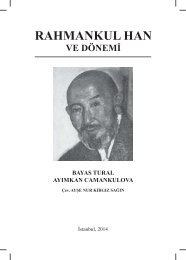THE SOVIET HISTORIOGRAPHY AND THE QUESTION OF KAZAKHSTAN’S HISTORY
SOVYET-TARIH-YAZICILIGI-ENG
SOVYET-TARIH-YAZICILIGI-ENG
Create successful ePaper yourself
Turn your PDF publications into a flip-book with our unique Google optimized e-Paper software.
<strong>THE</strong> <strong>QUESTION</strong> <strong>OF</strong> <strong>KAZAKHSTAN’S</strong> <strong>HISTORY</strong> 195<br />
the communities of Turkish descent, the term “Tatar” began to be<br />
replaced by “Turkish-Tatar” within the course of time. 361<br />
As the Russian Empire continued its expansion, some specific groups<br />
began to emerge under the broad “Tatar” category. As Russia became<br />
an empire in continental level at the end of the nineteenth century, the<br />
“Tatars” category became a framework of three distinct groups: 1) Asian<br />
or Siberian group (the Tatars of Altai, Abakan, Chulym, Kuznetsk, Baraba,<br />
Tobol and Irtysh); 2) European group (the Tatars of Kazan, Astrakhan<br />
and Crimea); 3) Caucasian group in between the European group and<br />
the Asian group (the Tatars of Azerbaijan, Kabarda and Dagestan). 362<br />
At the same time, we have to express that Russian Empire’s some<br />
Turkish-background peoples were not included under the framework<br />
of “Tatars” and were called with their traditional peculiar names<br />
(such as the Kyrgyz, Uzbeks, Turkmens, Yakut etc.). 363 In a prominent<br />
encyclopaedia series published in Russia at the end of the nineteenth<br />
century, this issue was highlighted. It claimed that the usage of the<br />
name “Tatar” only for some specific ethnic communities created “a<br />
historical mistake” and added that the communities called with this<br />
name did not call themselves as “Tatars”. 364<br />
The example of Kazan Tatars verifies this claim. It is verifiable that<br />
this community that had been called as “Kazan Tatars” or “Volga<br />
Tatars” by the Russians from the ancient times did not adopt this<br />
name even at the end of the nineteenth century. In the middle of the<br />
milieu of political chaos in the last days of the Russian Empire at the<br />
beginning of the twentieth century, certain debates erupted among<br />
the intellectual circles of the Volga-Ural region Muslims on ethnic<br />
name and historical identity issues. A competition over the concepts<br />
of “being Muslim”, “being Bulgarian”, “being Tatar” and “being Turk”<br />
peaked. However, at the end, the name “Tatar” gained permanence.<br />
In order to grasp its purposes, we have to concentrate on the history<br />
of Volga-Ural region.<br />
361 In the 86-volume Russian Encyclopaedia of Brokgauz and Efron published between<br />
1890 and 1907, the word “Tatar” was presented as a historical term. On the<br />
other hand, the term “Turk” was classified as a contemporary term and a synonym<br />
of “Turkish-Tatar”.<br />
362 “Tatarı”, Entsiklopediçeskiy slovar Brokgauza i Efrona, C. 64, p. 672, http://dlib.<br />
rsl.ru/viewer/01003924196#?page=202<br />
363 Chronologically speaking, Russians named the early communities they met<br />
(that is, the frontier communities) as “Tatars”; whereas, they called the communities<br />
they met afterwards with their traditional namep.<br />
364 “Tyurko-Tatarı”, Entsiklopediçeskiy slovar Brokgauza i Efrona, p. 347.



